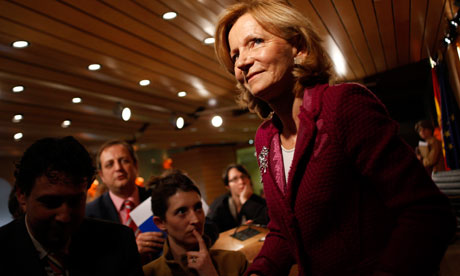Portugal bailout terms must be strict, EU finance ministers warn
• Plans that caused government collapse will be starting point
• Spain says bailout 'completely out of the question'
• Spain says bailout 'completely out of the question'

Portugal bailout: Spanish economy minister Elena Salgado has ruled out a rescue package. Photograph: Susana Vera/REUTERS
Portugal has been served notice that it will need to endure years of unprecedented austerity, spending cuts, and tax rises if Europe is torescue it from national insolvency to the tune of €80bn.
The daunting terms of the proposed three-year bailout were spelt out by EU finance ministers meeting in Hungary. It was clear that while the 17 countries of the eurozone are to bear the brunt of the bailout, Britain will also be liable for several billion euros in loans to Portugal through its participation in the emergency fund managed by the European commission.
Senior EU officials said the terms for the bailout were to be finalised by mid-May, a fortnight ahead of early elections in Portugal following the collapse of the centre-left government of José Sócrates, toppled last month when the opposition rejected his minority government's austerity package aimed at fending off the need for a European rescue.
If the main political parties could not agree on Sócrates's cuts package, they will now have to agree on a more savage programme dictated by the EU.
The Sócrates proposals will be merely a "starting point" for the austerity measures to be agreed with the European commission, the European Central Bank, and the International Monetary Fund, said Olli Rehn, the economic and monetary affairs commissioner.
The Finnish finance minister, Jyrki Katainen, went further.
"The package must be harder and more comprehensive than the one the parliament voted against," he said. "The package must be really strict because otherwise it doesn't make any sense."
European leaders insisted that Portugal's main and intensely hostile political parties bury their differences to reach agreement on the pact with the eurozone – a tall order in the midst of an election campaign.
"We call on all political parties in Portugal to swiftly conclude an agreement on the adjustment programme and form a new government after the upcoming elections with the ability to fully adopt and implement the agreed fiscal consolidation and structural reform measures," said a statement from the EU finance ministers.
It was clear that there will be no bailout unless the Portuguese parties reach a consensus on terms tougher than those that brought down the Sócrates government.
"After an agreement has been reached with the Portuguese authorities and supported by the main political parties, the programme will be endorsed" by the EU, the statement said.
Rehn added that a Portuguese cross-party consensus on the harsh medicine being prescribed was "essential."
While the aim is to agree the "strict conditions" for the bailout pact by mid-May, the programme would come into operation after the election on June 5.
This way, whoever wins the Portugal poll will not be able to disavow the EU-prescribed programme, avoiding an Irish scenario where the Enda Kenny's new government is seeking to amend the terms of its €85bn bailout negotiated by the fallen Cowen administration.
The Portuguese will need to embark on "ambitious fiscal adjustment to restore fiscal sustainability", "an ambitious privatisation programme" as well as labour market reform and policies combating "macro-economic imbalances", and disburse state aid to keep the banking sector "liquid and solvent" – measures that should please the big European banks exposed in Portugal.
After a decade of stagnation in western Europe's poorest country, the tough terms being pressed on Portugal look certain to prolong the agony and will spur mounting demands that the most vulnerable members of the eurozone should be allowed to default on or restructure their debts, with investors for once being included among the losers from a rescheduling.
While EU leaders maintain that the third eurozone bailout of a small "peripheral" country in less than a year will stabilize the single currency and end the crisis, the countries being rescued are condemned to years of hardship, generating much bitterness in the EU.
In a portent of the rising political animosity within the EU, the former Portuguese prime minister, Mario Soares, last week accused Germany and Chancellor Angela Merkel of dictating policy to the rest of Europe.
"Nowadays all [EU member states] are more or less dominated by Germany and Chancellor Merkel who has forgotten what Germany owes to the European Community and now considers herself as the owner of Europe – supported by her helpful ally, President Sarkozy."
Not Spain
Ministers tried to drive home the message in Budapest that the contagion that has spread like a virus across the eurozone's southern periphery would not hit Portugal's larger neighbour Spain, which has scrambled to reform its labour market, pension system and savings banks this year to avoid a similar fate.Spanish economy minister Elena Salgado said a bailout for her country was "completely out of the question", and the European economic and monetary affairs commissioner Olli Rehn told reporters he was sure Spain would not require assistance.
For now at least, markets seem to agree. The spreads between Spanish bond yields and those of the German Germany's benchmark bonds – a key measure of investor confidence in Spain's finances – have changed little since Portugal announced on Wednesday it would seek aid.
No comments:
Post a Comment